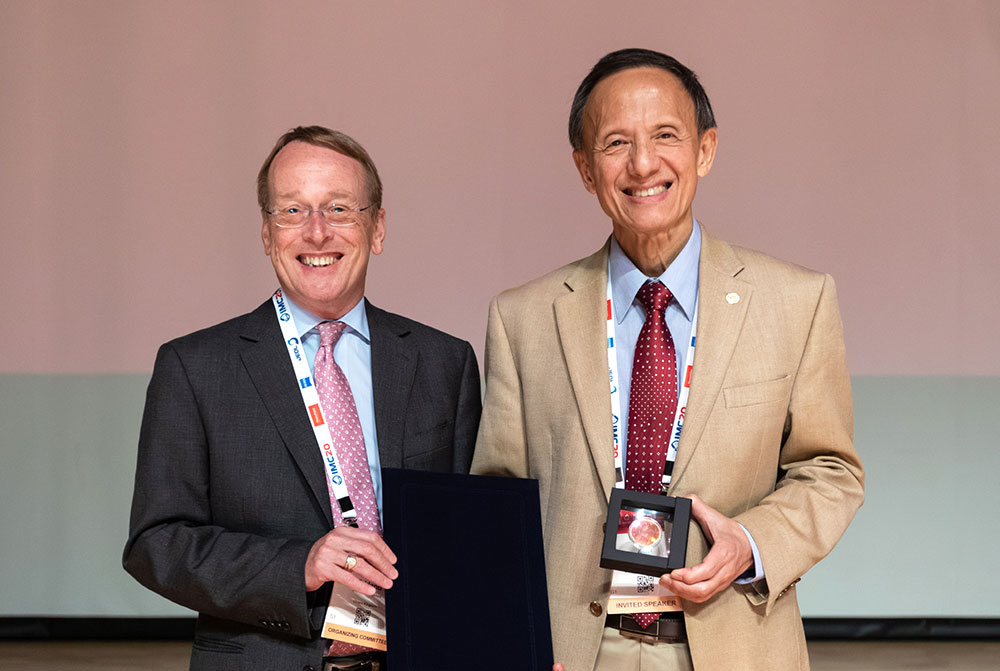Brookhaven Lab Physicist Receives Prestigious Vernon Cosslett Medal
Yimei Zhu honored by the International Federation of Societies for Microscopy for his sustained contributions to the field of electron microscopy
February 12, 2024
 enlarge
enlarge
Oxford University professor Angus Kirkland, president of the International Federation of Societies for Microscopy, presents Yimei Zhu (right) with the 2023 Vernon Cosslett medal at the 20th International Microscopy Congress in Busan, Korea.
UPTON, NY – Yimei Zhu, a senior physicist at the U.S. Department of Energy’s Brookhaven National Laboratory and leader of the Lab’s Nanoscale Structure and Structural Defects in Advanced Materials Group within the Condensed Matter Physics and Materials Science Division, has been awarded the 2023 Vernon Cosslett Medal by the International Federation of Societies for Microscopy (IFSM).
The medal, presented only once every four years coinciding with the quadrennial International Microscopy Congress, recognizes outstanding achievements in the field of microscopy instrumentation and methodology. It is named after the legendary British physicist Vernon Ellis Cosslett, who is widely considered the founding father of electron microscopy. The award includes a medal, an official certificate, and a monetary commendation.
Zhu received the award at the 2023 IFSM Symposium, which was part of the 20th International Microscopy Congress, held September 10-15, 2023, in Busan, Korea. He was nominated by the president of the Microscopy Society of America, who stated in his nomination letter, “Over the last 35 years, Zhu has pioneered the field of electron microscopy by innovation and development of electron microscopy instrumentation and methods.”
“It is indeed an honor to be recognized with this prestigious award, having been selected from an extensive and accomplished group of scientists and microscopists spanning both the realms of the life and physical sciences. In particular, delivering a plenary awardee lecture on the same podium as the Nobel laureates at the microscopy congress is a truly humbling experience," expressed Zhu with gratitude.
Over the past several decades Zhu has been at the forefront of advancing electron microscopy optics and instrumentation across many areas. He and his students started with the development of sample stages to expand experimental “in-situ” and “in-operando” capabilities, i.e., to study materials under realistic operating conditions. This advancement allows researchers to expand the variety of working environments in which they can study their samples, including the ability to accurately calibrate and apply electromagnetic fields and high-frequency electron spin currents. They also pioneered sample holder development by integrating optical cables, mirrors, and piezo-tips to employ tunable laser and electric-bias for studying quantum materials.
Working with the Hitachi High-Tech Corporation, Zhu and his team developed novel optics and detectors for electron microscopy. They took advantage of the “secondary electrons” that are generated by the primary transmitted electrons and that are sensitive to the structure of sample surfaces. They achieved, for the first time, a resolution of 1 angstrom (one ten-millionth of a millimeter!) in surface imaging in a transmission electron microscope. This method allows both the sample surface and interior to be studied simultaneously.
Working with Euclid Techlabs, a small accelerator technology company, Zhu spearheaded the development of an electron “pulser” to enable ultrafast electron microscopy. Their work led to microwave imaging capabilities, allowing researchers to study sample dynamics in real time over a wide range of frequencies; for example, materials that are used for antennas and sensors in mobile devices, and materials used as quantum bits (“qubits”) in quantum computers, all operate in the gigahertz (GHz) frequency range. This achievement, as the nomination notes, was a “game changer” for the field.
Supported by Brookhaven research and development funding, Zhu also actively participated in the development of the megavolt ultrafast electron diffraction system at the first National Synchrotron Light Source. The system was the first of its kind to capture ultrafast quantum behavior in condensed matter. He and his group developed new methodologies based on quantum theory and the wave nature of electrons to elucidate the intricate dynamics of charge and atomic lattice interactions. Recently, he and his collaborators designed a compact megavolt electron microscope for ultrafast imaging that uses a series of tiny asymmetric lenses (instead of traditional bulky symmetric round lenses) based on specialized magnets called quadrupoles. This microscope, which has a wide range of potential applications across many fields—from imaging difficult-to-crystallize proteins to visualizing hard-to-observe chemical reactions—has received a lot of attention from both the microscopy and accelerator communities.
“In order to be at the forefront of characterization of matter at unprecedented time and length scales we must continually advance our instrumentation,” Zhu said. “The goal is to comprehend the essence of matter, unraveling its potential to impact people’s lives and society. The tools are the enablers of scientific progress.”
Zhu is the recipient of numerous awards, most recently the Microanalysis Society’s highest honor, the Peter Duncumb Award for Excellence in Microanalysis. His other accolades include the prestigious Distinguished Scientist Award from the Microscopy Society of America, two R&D 100 Awards, and four Microscopy Today Innovation Awards. He has served on various government review panels, committees, institutional advisory boards, and editorial boards of microscopy journals, published 700 peer-reviewed scientific journal articles and holds many patents. He is Fellow of American Physical Society, American Association for Advancement of Science, Materials Research Society, Microscopy Society of America, and Microanalysis Society. In addition to his positions at Brookhaven Lab, Zhu is an adjunct professor at Columbia and Stony Brook Universities.
Zhu received an MS and a PhD in materials physics from Nagoya University, Japan, and conducted postgraduate research in physics at the University of Virginia.
Brookhaven National Laboratory is supported by the Office of Science of the U.S. Department of Energy. The Office of Science is the single largest supporter of basic research in the physical sciences in the United States and is working to address some of the most pressing challenges of our time. For more information, visit science.energy.gov.
Follow @BrookhavenLab on social media. Find us on Instagram, LinkedIn, X, and Facebook.
2024-21693 | INT/EXT | Newsroom










